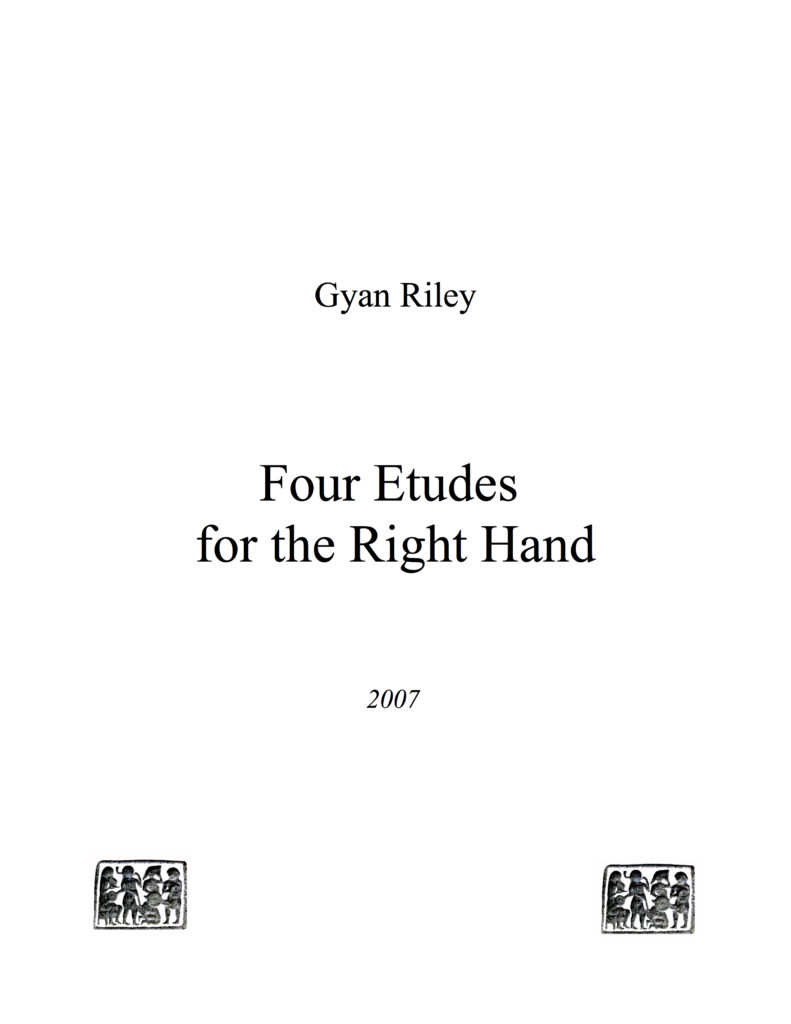
The first time I saw Gyan Riley was at a concert at the Freight and Salvage in Berkeley, California. After that initial concert, I tried to catch him live every chance I got up to the time when he relocated to New York City. I also managed to take a private lesson with him when he was still based in Oakland, California. It was such a great lesson and I still remember his advice that helped me develop a much more secure right hand technique for scale playing. Recently, I was going through my books and found this particular one that I bought at a house concert performance he did in San Francisco. I remember going back and forth, trying to decide which of his books to get and settled on this one. I’m glad I did!
This 15-page book by guitarist and composer Gyan Riley is a masterpiece. It contains 4 etudes that challenges the right hand and introduces different musical challenges.
Etude 1: The Odd Arpeggio is preceded by a page of right hand exercises related to the groupings that Gyan explores in the piece. In a way, this compact volume not only gives you the piece but also gives you an opportunity to prepare for the etude. Gyan’s skill as an educator shines here as he cares for the guitarist attempting these pieces.
For Etude 2: The Inner Voice, Gyan gives exercises in balancing different voices by marking certain notes in red to highlight which voices need more stress. These exercises are challenging for me and definitely have helped me develop my right hand control whenever I come back to study the piece.
Etude 3: Trillemolo, a Homage to Agustin Barrios Mangore is one of my favorite pieces in the volume. It explores different variations of right hand tremolo technique to produce both trills and tremolos.
Concluding the book, Etude 4: iPick is a Homage to John McLaughlin. This piece introduces Gyan’s single-string rasguedo technique, picking with the “i” finger. An interesting musical piece, it alternates between harmonics, scalar lines with some chordal stabs. Throughout the book, Gyan always focuses on musically developing each piece even in these etude settings.
In short, this is a great book to add to your classical guitar library for study and technique development. I bought my copy from Gyan years ago in person but now you can get a digital copy right from his website.
Pros: Great pieces, musical and beautiful.
Cons: None.
TLDR: For intermediate to advanced classical and fingerstyle guitarists interested in developing their technique beyond the standard classical repertoire, this is a good book to invest in.
How to buy:
Buy it online from Gyan Riley himself right here:
http://gyanriley.com/music.html
[Read more Reviews]
Review #24
Review #23
Book Review: Daniel Donato – The New Master Of The Telecaster: Pathways To Dynamic Solos
Review #22
Course Review: Understanding & Applying the Chromatic Scale by Frank Vignola
Review #21
Book Review: Movable Shapes – Concepts for Reharmonizing ii-V-I’s by Sheryl Bailey
Review #20
Review #19
Review #18
Review #17
Video Review: Essential Percussive Guitar Riffs with Jon Gomm
Review #16
Review #15
Video Review: 8 Sets of Jazz Blues Changes by Randy Johnston
Review #14
Book Review: The Thesaurus of Scale Tone Chords by Alex Rogowski
Review #13
Video Review: Bebop Flow – Connecting Harmonic Concepts with the Family of 4 by Sheryl Bailey
Review #12
Book Review: Improvising Without Scales – The Intervallic Guitar System of Carl Verheyen
Review #11
Review #10
Video Review: Dave Hill – Motif Development (Jazz Guitar Society)
Review #09
Book Review: A Guide to Developing a Chromatic Approach to Improvisation by Tony Greaves
Review #08
Review #07
Review #06
Review #05
Review #04
Review #03
Review #02
Review #01
[Submissions for Review Consideration]
- Are you an author who wrote a jazz, guitar or music book?
- Have you created a DVD or an online video course or subscription based website?
- Would you like me to review your book/course?
Please send me a message at azsamad2 at gmail.com with:
For courses: a link to the course/video/product + access info etc.
For books: a link to the book (Dropbox) or PDF attachment (if it’s small) for review consideration.
Depending on whether I dig the book/course, I’ll let you know if I do plan to review it!
I cannot guarantee a review for every submission & if I’m not too into it, I may opt not to review it. I mean, it’s better to get a good review that for me to write a bad review just because it’s not a match for the kind of stuff I dig right? :p
NOTE: All reviews reflect my honest personal opinion so be aware that I will point out both cool Pros and Cons that I see in the work. You dig? 🙂
Leave a Reply